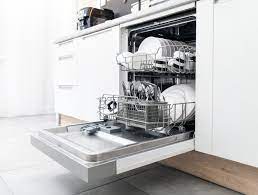A delightful family dinner, with laughter and conversation filling the air.
As the meal concludes, the dishes pile up, ready to be whisked away by the trusty dishwasher.
Instead of dishwasher detergent, someone inadvertently filled the soap dispenser with regular dish soap.
Suddenly, your kitchen turns into a scene from a whimsical bubble-filled adventure.
If you’ve found yourself in this soapy predicament, fear not – it’s a common mishap with a straightforward solution.
In this article, we’re here to be through the process of restoring order, eliminating the suds, and reviving your dishwasher, so you can enjoy sparkling clean dishes once again.

How to get dish soap out of dishwasher
Let’s provide you with a practical step-by-step guide. Following these steps on how to get dish soap out of dishwasher,
You can solve this problem easily to ensure that the dishwasher does not have any soap residue:
Safety First
Before you begin, ensure your safety.
To protect your hands from any possible damage, you must wear rubber gloves.
Dish soap can be harsh on the skin, so it’s best to take precautions
Turn Off the Dishwasher

To prevent the soapy water from spreading further, turn off the dishwasher.
If it’s in the middle of a cycle, allow it to finish, but make sure it’s not actively spraying water when you proceed to the next step.
Open the Door
Gently open the dishwasher door, but be cautious – there might still be some residual suds and water inside.
Use a towel or cloth to carefully blot and absorb any visible suds.
Remove Excess Water
The next task is to remove excess water from the bottom of the dishwasher.
You can use a sponge or towels to soak up the water.
Wring out the excess water into a bucket or a sink.
Continue this process until most of the water is gone.
Best drinking glasses for dishwasher (Best 7 suggestions)
Manual Soap Removal
With the excess water gone, it’s time to deal with the dish soap.
Locate the dishwasher’s filter or spray arm, where most of the soap tends to accumulate.
Scoop out any visible soap residue with a spoon or spatula.
Be gentle to avoid damaging any dishwasher components.
Rinse the Interior
Now that you’ve cleared the soap, it’s essential to rinse the dishwasher’s interior.
Fill a cup or bowl with water and pour it into the dishwasher.
Close the door and run a short rinse cycle.
This will help flush out any remaining soap.
Check for Residue
After the rinse cycle is complete, check for any lingering soap residue on the dishes or in the dishwasher.
If you notice any soap spots, you might need to rewash the affected dishes by hand.
Resume Normal Operation
Once you’re confident that the soap is entirely removed, you can turn your dishwasher back on and resume your regular dishwashing routine.
Ensure that you’re using the correct dishwasher detergent to avoid a repeat of the soapy mishap.
Best and most effective dishwasher detergent for grease ever
Potential consequences of leaving dish soap in the machine
Certainly, let’s discuss the potential consequences of leaving dish soap in your dishwasher.
It’s essential to understand why addressing this issue promptly is crucial.
Until you know the correct steps for how to get dish soap out of dishwasher, here are the possible consequences of leaving dish soap inside the washing machine:
Understanding the Situation
Take a moment to realize that we all make mistakes and this is a common one.
In this case, it’s using regular dish soap in the dishwasher. However, overlooking this mistake can lead to some practical challenges.
Soapy Residue on Dishes
One of the immediate consequences is the likelihood of soapy residue left on your dishes.
If you’ve ever tried to rinse a plate with a stubborn layer of soap, you know it’s not a pleasant experience.
The residue can be tough to remove, and you might end up having to rewash your dishes by hand.
Potential Damage to Your Dishwasher
Regular dish soap can create excessive suds, more than what your dishwasher can handle.
These suds can overflow, damaging the dishwasher’s mechanical components.
Pumps and valves are particularly susceptible to damage, which can be expensive to repair or replace.
Choosing the Best Air Gap for Dishwasher
Increased Energy and Water Usage
A dishwasher struggling with an excess of suds may need to run additional rinse cycles to clear the soap.
This means increased energy consumption and more water usage, which is not ideal for your utility bills or the environment.
Longer Cleaning Time
Aside from the added energy and water costs, your dishwasher might take longer to complete a cycle when battling soapy suds. This can disrupt your daily routine and make it challenging to have clean dishes ready when you need them.
Inconvenience
Wasting time, energy, and water are all inconveniences, and you certainly didn’t invest in a dishwasher to create more work for yourself.
Leaving dish soap in the machine can disrupt your kitchen routine and add unnecessary stress.
Potential for over foaming
In extreme cases, excessive soap can cause the dishwasher to foam over, flooding your kitchen.
While it may not be a disaster on the scale of a Hollywood film, it’s certainly a mess you’d prefer to avoid.
Understanding these consequences helps you see why it’s important to address the issue promptly.
While it may not be a life-or-death situation, it can disrupt your daily life and create more work.
So, don’t fret if it happens; instead, take action to ensure your dishwasher runs smoothly and efficiently.
Why you shouldn’t put plastic in the dishwasher?
While many plastics are labeled as dishwasher-safe and can be washed in a dishwasher without any issues, there are certain types of plastics and plastic items that you should avoid putting in the dishwasher. Here are some reasons why you should exercise caution when washing plastic items in the dishwasher:
Heat Sensitivity
Some plastics are sensitive to high heat, and the high temperatures reached during the dishwasher’s drying cycle can cause them to warp, deform, or even melt. This can ruin the shape of your plastic items.
Chemical Reactions
Dishwasher detergents and high-temperature water can potentially cause chemical reactions with certain types of plastics, leading to discoloration or deterioration of the plastic material.
Potential Release of Harmful Chemicals
In some cases, plastics may contain chemicals like BPA or phthalates that, when exposed to high temperatures, can potentially leach into the dishwasher water or onto other dishes. This is of particular concern for food containers, as it may pose health risks.
Lack of Durability
Repeated exposure to high-pressure jets of water, strong detergents, and the mechanical action in the dishwasher can cause wear and tear on certain plastic items over time, making them less durable and shortening their lifespan.
To help you to decide whether it’s safe to put a plastic item in the dishwasher, consider the following guidelines:
Check the Label
Look for a “dishwasher-safe” label on the item or its packaging. This label indicates that the manufacturer has tested the plastic for dishwasher use.
Consider the Type of Plastic
Plastics are labeled with recycling codes (e.g., numbers 1-7) that provide information about the type of plastic used. Some plastics are more dishwasher-friendly than others. For example, many items with recycling code “5” (polypropylene) are considered dishwasher-safe.
Use the Top Rack
If you’re uncertain about a plastic item, placing it on the top rack of the dishwasher is usually safer because the top rack is exposed to slightly lower temperatures during the drying cycle.
Avoid Heated Dry Cycle
If your dishwasher has an option for a heated drying cycle, consider turning it off when washing plastic items to reduce exposure to high heat.
Hand Wash When in Doubt
When in doubt about a plastic item’s suitability for the dishwasher, it’s safer to hand wash it with mild soap and warm water to prevent any potential issues.
Does vinegar destroy the dishwasher?
Vinegar is generally safe to use for cleaning and deodorizing your dishwasher, but it should be used in moderation and according to proper guidelines to avoid any potential issues.
Acidic Nature of Vinegar
Vinegar is mildly acidic, which can be useful for removing mineral deposits, dissolving grease, and neutralizing odors in the dishwasher. However, if used excessively or too frequently, the acidity of vinegar could potentially affect certain components of the dishwasher.
Dishwasher Components
The parts of the dishwasher that may be sensitive to acidity include rubber seals and gaskets. Prolonged and repeated exposure to vinegar could cause these parts to deteriorate over time. It’s essential to use vinegar sparingly and as part of a regular maintenance routine, rather than in every wash cycle.
Proper Usage
When using vinegar to clean your dishwasher, it’s recommended to follow the manufacturer’s guidelines and use vinegar in a way that minimizes its contact with sensitive components. For example, you can place a container of vinegar in the top rack of the dishwasher during a wash cycle, allowing the vinegar to disperse and clean the interior.
Rinse Thoroughly
After using vinegar, it’s crucial to ensure that the dishwasher is thoroughly rinsed to remove any residual vinegar before using it to wash dishes. This prevents the lingering acidity from affecting your dishes or the dishwasher’s components.
Alternatives
If you have concerns about using vinegar, you can consider other dishwasher cleaning methods, such as using commercial dishwasher cleaners specifically designed for the purpose. These cleaners are typically less acidic and formulated to be safe for dishwashers.
In conclusion
We talked about how to get dish soap out of dishwasher, addressing the issue of dish soap in your dishwasher might not be a life-altering challenge, but it’s a task worth mastering to keep your kitchen running smoothly.
We all make simple mistakes, and using regular dish soap instead of dishwasher detergent is one of those common slip-ups.
However, by following the steps outlined in this guide, you can quickly and effectively resolve the situation, saving yourself from potential inconveniences and unexpected consequences.

